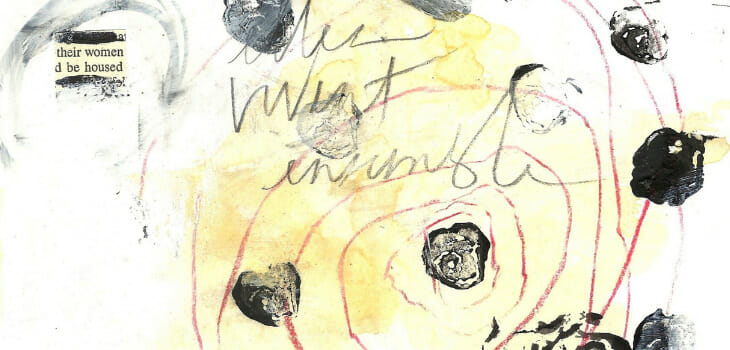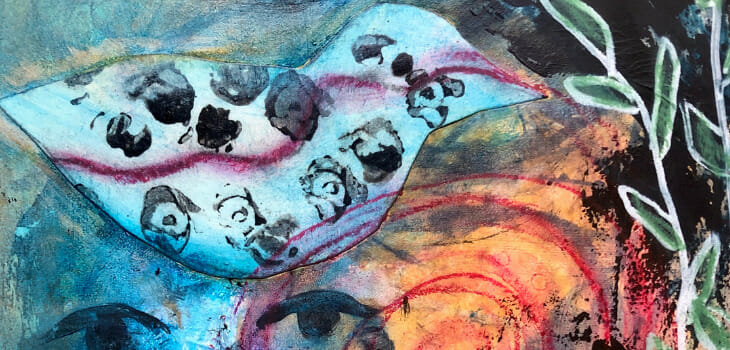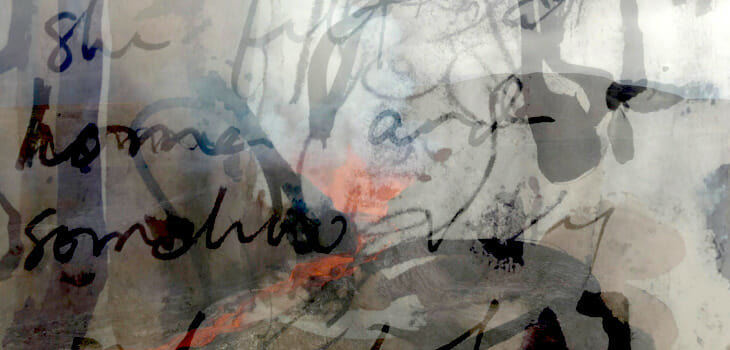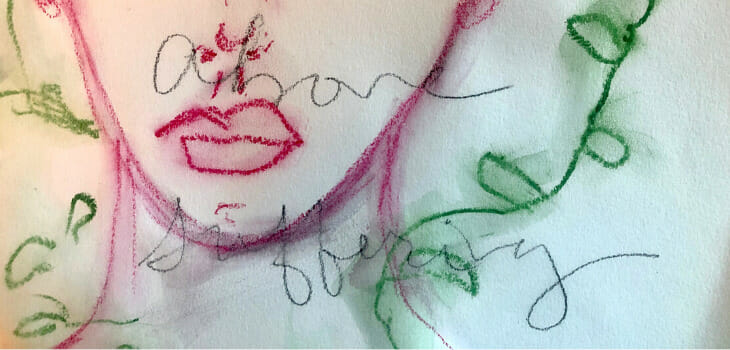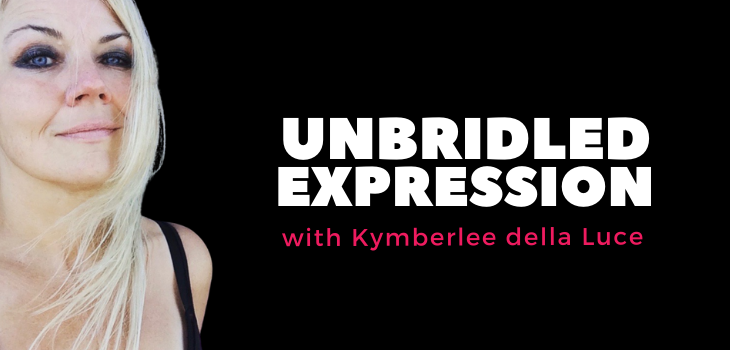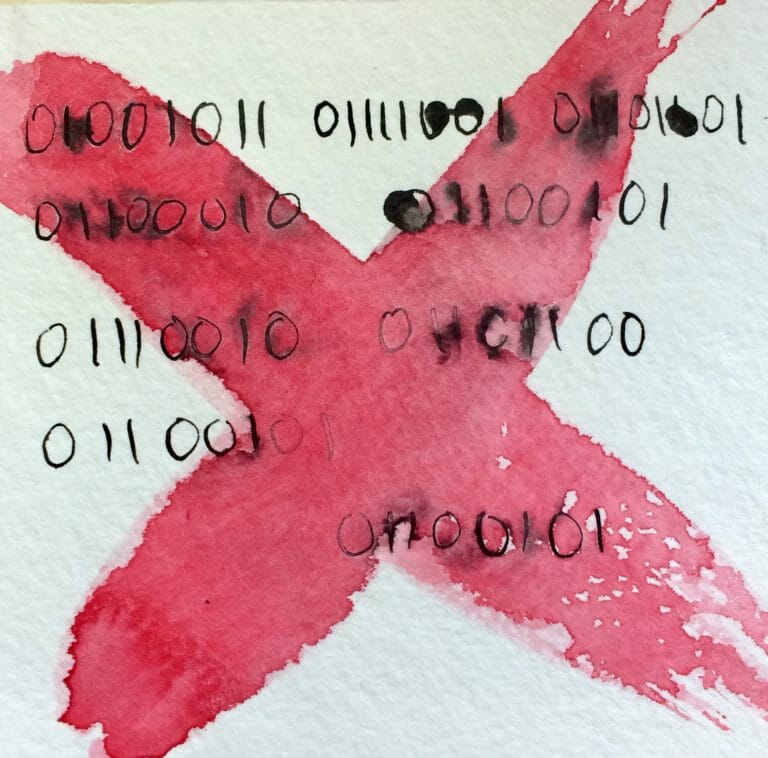Unbridled Expression with Kymberlee della Luce Transcripts: Transformative Obstacles, Collective Care and Singing the Blues
Please enjoy this transcript from Transformative Obstacles, Collective Care and Singing the Blues!
In this episode, I talk about getting blocked on Instagram by “art critic” @jerrysaltz, overcoming obstacles, collective care, transformation of self and culture, and why Chani Nicholas (@chaninicholas) has a business model I am emulating.
You can subscribe on Apple Podcasts, Spotify, RSS, Overcast, iHeart Radio, Amazon Music, or wherever you listen to podcasts.
legal stuff
Before you partake, please read the below, which applies to every transcript.
Kymberlee della Luce owns the copyright in and to all content in and transcripts of the Unbridled Expression with Kymberlee della Luce podcast, with all rights reserved, as well as her right of publicity.
WHAT YOU’RE WELCOME TO DO:
You are welcome to share the below transcript (up to 500 words) in media articles (e.g., The New York Times, Washington Post, The Guardian), on your personal website, in a non-commercial article or blog post (e.g., Medium), and/or on a personal social media account for non-commercial purposes, provided that you include attribution to “Unbridled Expression with Kymberlee della Luce” and link back to the kymberleedellaluce.com/podcast URL. For the sake of clarity, media outlets with advertising models are permitted to use excerpts from the transcript per the above.
WHAT IS NOT ALLOWED:
No one is authorized to copy any portion of the podcast content or use Kymberlee della Luce’s name, image or likeness for any commercial purpose or use, including without limitation inclusion in any books, e-books, book summaries or synopses, or on a commercial website or social media site (e.g., Facebook, Twitter, Instagram, etc.) that offers or promotes your or another’s products or services.
Kymberlee della Luce:
0:00
[Soulful Groove Intro Music] This is Unbridled Expression. And I’m your host, Kymberlee della Luce. Every Wednesday, we talk about art, culture, creativity, and whatever else we’re curious about. Thanks for listening. And if you like it, please do subscribe, and share.[Music Fades]
0:32
Hey! It’s Kymberlee, thank you for being here. Thanks for listening. I have an interesting show for you today, on our third episode, this episode is going to be kind of some sort of mix some alchemy, I decided to go with a couple of topics that I had in mind. But I also drew a couple of cards from some different decks. And I’m going to draw a card later in the episode, and then just give a little reading from it a tarot card. So the first card that I drew, is from Brian Eno’s Oblique Strategies deck that I’ve had for a long time. [paper rustling sound] And you can probably hear the paper, that’s funny. The card is “cluster analysis”, which, you know, I looked at it and I thought, “huh, what does that mean to me right now?” What does that mean to us collectively? Because that’s kind of the way I do things. And I would ask you, what does “cluster analysis” mean to you? Something to journal about? Something to think about? I want to just do a first thought best thought, because I just drew the card. And funny, funnily, [laughing] funnily, just before I came to record this, there were a bunch of trucks out in the alley. And in the, you know, just like our apartment is right on the alley, and it was a cable company, truck, and, you know, garbage truck, and they were doing their reverse [beep, beep beep], right? And I was like, ?Oh, I’m gonna have, I’m gonna have to wait to record” because I do have a little bit of a sound studio, but not that much, you know what I’m saying? So I, I waited for a moment. And then I thought, you know, I’m just gonna have to get going, because right now, I have the apartment to myself, and this is a good time to record. Also, I have a deadline. And working with deadlines can be tricky when you are surrounded by noises and such. So cluster analysis is an interesting one. Also, I drew a card from a deck that my therapist gave me, I actually don’t know the name of the deck, but I’ll, I’ll put it in the show notes. It just has like an image and one word. And today’s word was obstacles. And I immediately was like, oh, no, I don’t want to do that one. But I decided to go with it. And then I drew another card, which I’ll tell you about in a bit. So let’s talk about cluster analysis and obstacles. Okay. Right now, we’re in the middle of a pandemic. And there’s a lot going on in the collective that, quite frankly, I’m not going to talk about right now, I just want to say that we as a collective, are facing a lot of obstacles to justice, to inner peace to what would we call it? Well, a good climate like we need to reverse climate change, and it’s just a few of those little small little things here. [laughter] And I’m, for me on an individual level, I have obstacles in my life that I need to, you know, kind of work through like we all do. And I’ll talk about a little a little bit about those because those are the ones I know and maybe some of that will resonate with you.
4:13
So I I think about those two words obstacle and cluster analysis together and we think about you know, like when I was looking at the window there were a bunch of guys trying to get the one the garbage truck to go up the alley and the the like cable truck had to back up and they like ran over one of those little like cement barricade things and like and dragged it into a parking so is crazy. So I you know, I’m watching all this and trying to gather my thoughts for this recording and it just it just makes me laugh. how the universe works. Because, yeah, there was definitely a cluster going on. And some obstacles. They made it through though, yay, they did it. They figured it out. And so will we! That’s what I say. I have this interesting habit of frequently saying, Well, the truth is, and I’ve caught myself recently saying, and laughing with my kids about how often and like, well, you know, the truth is as though I am the holder of all the truth, and I’m just gonna call myself out right now about that. Why not? Right? Because I talk about accountability and the system that we’re in, and a think about how we probably will get better at changing things. If we look inside and say, Well, you know, how am I part of the problem? So I think I’m part of the problem by assuming that I sometimes know what’s true for other people, sometimes I do, because I’m kind of a psychic. But I don’t always, you know, I don’t have all the information. None of us do. That’s why we’re all here to learn together.
6:10
So, yeah, I’m just gonna relax, my therapist right now would tell me to take a breath. [deep breath] We can take a breath together. And I want to blow my air into the microphone, however, that’s unpleasant for the listener, I have come to realize. So the other card that I drew, besides “cluster analysis”, and “obstacles” was “transformation”. And I think that we have the opportunity, you know, to transform, kind of, as we go through the obstacles as, as we sort of, you know, it’s like, it’s like laundry, when you put it in the washing machine, or if you hand wash it, you have to agitate it, right to get the [sound like mm-hmmm] out, right, like, you know, in most things in life require created even creativity, even like birth, right, like giving everything requires a certain amount of agitation. And I sort of feel like we’re here. We’re there, I mean. Right now, in the collective and, and I just think it’s worth, like noticing and talking about, because while I have actually been on kind of a, you know, like riding a happy wave recently, doing this podcast and some other things I’m working on. I, you know, like, not everyone in my life is. Not everyone in the world is–there’s a lot to grieve. And there’s just so much going on, though, that we can just sort of sit with, you know, and notice that these obstacles that we have to, like, gently move out of the way sometimes, sometimes we need to take a hammer and kind of bust them up, you know, I don’t know, make gravel, I don’t know. But you know, we have to, like, do that.
8:03
And so one of my current obstacles is trying to, like do production stuff, like stuff on the website stuff here on the podcast, and with some other projects I’m working on, and it is so tiring to do so much production all by myself. Wow. So tiring. I mean, it’s like fun, because I love solving problems. And I love to I’m trying to not say I’m so much by the way. So yeah, you can count them. And, you know, if you want to make little tick marks and report back to me on Twitter, like, “Hey, this is how many times you said ‘um'”. Like a healthier version of the of a drinking game, I guess. [laughing]. Anyway, now I don’t remember what I was gonna say.
8:58
Obstacles, production, [pausse] production is you know, a lot. And, you know, this past couple years, as I’ve been studying business, there have been a lot of recommendations to, you know, get a virtual assistant or, you know, go, you know, offshore to the Philippines to get a virtual assistant. You know, have other people do your work for you so that you can focus on your business. I love this idea. I do. I love the idea of having a team, right? But I don’t love the idea of people making a pittance. Right? (Because that’s all I could really afford right now.) Um, just making a little bit of money to, to do something for me because they’re desperate. You know, like, I think a lot of the time we we just kind of live inside this capitalist system. And you know, we think that you know, it’s it’s totally cool to just like use, people, you know, like, “oh, yeah, you know, it’s a corporation. I mean, of course the you know, the workers they’re going to be, you know, they’re going to be having a difficult time they’re going to, you know, we we can’t we just can’t pay them that much.” But you know, that’s not true. That’s not true. There’s a, someone that I really love and respect, whose work I really , I don’t know her. But I’ve followed a woman named Chani Nicholas, who’s an astrologer for a long time. She’s huge now. But I’ve followed her for many years. So she wasn’t so huge back then. And I guess that’s like a little feather in my cap. [laugh] But I really respect and admire her because she made it through, you know, working through her business and doing things with whatever tools she had on hand, which is what I’m doing. And also, you know, she’s now she has like, a, she’s incorporated and the she has employees and her sort of benefits package for her employees is out-, you know, just, it’s crazy. It’s amazing. When I have a team–and I will–that’s what I want to do. I want to be able to give people stipends and, um, you know, more than livable wage, honestly, you know, just like, Dan Price from Gravity. I don’t believe in–I cannot support actually–it would make me physically ill to–I’m gonna start crying. [crying and talking] It makes me feel sick inside when I think about being in a situation where I’m benefiting from, you know, my, frankly, my privilege. I mean, I do I have economic privilege now, I mean, I suffer I have suffered–and I HAVE suffered–from classism over the years of being a single mom and living in poverty, there’s a lot of my story that I don’t need to talk about. But it’s it is true that I still have privilege, right? I live in the West, I live in the United States. I have you know, white skin and blue eyes and my skin’s not white, but you know what I mean? I have–I benefit from the system around us, you know? Yeah.
12:17
What if we take a singing break here and then I’ll get back to talking about benefits. [laughing] What do I want to sing to you? [singing soulfully] “I just want to take a break I just want to take a break. Maybe one day I’ll have a commercial and I’ll have a break [scat singing].” Now you know I’m gonna do? We’ll just do like a little singing the blues and you can add in your own lyrics. [singing a blues riff] “and and do no dude en da
12:49
da da da da da. Dude down and down. Went down to the grocery store. They gave him food. I decided to be friendly. Not rude. [bluesy vocal fill], cuz those people work their asses off. Yeah. And I don’t get… And they don’t get much pay [soulful vocal riff] because we’re living in late stage capitalism. And this is the late stage capital—ism blues.” [end singing] [laughing} That is really not my best work. I hope at least it amused you. [still chuckling] However, you can add your own lyrics. You know, like I don’t know [singing], “I have to walk to work in the morning. And that’s that, every day on my way to work, I see a couple rats. [ blues fill] ba doo da doo and there’s this man who yells at me across the street and all I want to do is tell him that I’m not a piece of meat. yeah, yeah, Because I got the I had to work. No, I gotta walk to work at five in the morning blues. Yeah,” [end singing] I see you. I see you. I do. I see us. I see us struggling inside of a system that is not working for a really large number of people. I don’t have a number, but I think we know what I’m talking about. So the other card that I drew was “transformation”. Right? I like that card. And um, yeah, I’m, I’m invested in changing the system that we’re in. Because I think that, um, well, I certainly I can’t do it alone. I know that. The truth is [laughing at self] I can’t do it alone, I can’t, I can’t do it alone. However–my daughter tells me that I repeat things for emphasis, I just did that. Okay. When you’re recording a podcast, you become very aware of yourself. And like, the things that you do, your little idiosyncrasies. It’s really crazy–Okay. Anyway, I am invested in changing and transforming the system that we’re in, um, there are so many obstacles to humanity having, you know, a more flowing existence and being aware of the system that we’re in, one of the ways that we have to do that is calling out the stuff that’s not working, like paying people a tiny little amount of money, when people at the top are making a humongous amount of money, right? I’m not gonna go into all the nitty gritty of that on the podcast, because you can look at the news, right? Follow Robert Reich, or Bernie Sanders on Twitter, and they will let you know what’s going on. It’s kind of crazy. um, And so you know, last week, I talked about bro culture and how problematic it is. And this is like, I guess I’m just kind of continuing on with with that, while also hopefully entertaining you a bit along the way. [laughing] um, but there, you know, there, there are things happening, things that really need to change. And if we just sit by and we’re bystanders, that not the best situation. So yeah. Speaking of: one of the things that I wanted to share with you is I, I hesitate to say the guy’s name, but I’m going to do it anyway. He’s, ya know, he’s famous. He’s, he’s an art critic, and he spouts off his mouth on the internet, as you know, we all do, right. Like, everyone’s shares their thing. Everyone gets to do that. However, I’m looking for it on my phone, which is why I’m stalling. I have it pulled up. I really do. Have it in my favorites. Yeah, so his name is Jerry Saltz. And I don’t want to misquote him. So I’m going to take a moment to find it. A pause, I’ll have to edit this.
17:47
Okay, so Jerry Saltz, last Thursday, said “New Year’s resolution for those in their 20s and 30s: Stop speaking to your parents more than once a week. They are loving you to death. You spend half the time on the phone lying to them anyway. You can’t individuate & have your nervous breakdowns on your own– No, he says– you can’t individuate & have your nervous breakdowns on your own. It hurts your work.” Uh I’m not sure what he means by that last bit. Anyway. Um. So a lot of people in his comments. disagreed with that a lot of people. People said things like, “Dude, you know, um”–b,y by the way, this is paraphrasing. You can you know, go and look at the the post if you want to see, but a lot of people disagreed with him and said things like, “you know, this, there’s a pandemic, what are you doing, telling people not to talk to their parents, right? Like, what kind of Western thinking is that?” etc, etc. And I said, I’m going to paraphrase because I don’t I don’t have so here’s the thing, I made a comment, and he deleted it and blocked me. So it’s interesting that he did that. And I what I said was something along the lines of, ” it’s interesting to me how often cis het white men say things like this. That is some really bad Western advice.” Right? Advice from like, the western context. And yeah, I think that’s one of our obstacles. Right? We are so crazy about individuating and, you know, pushing out pushing out pushing out, you know, getting away. We’ve been doing that, you know, we have a history of doing that the Western, you know, canon is filled with stories like that. The United States especially, and then as soon as we hit the, the the edge of The Western contiguous United States, then we, you know, gotta go to space now, you know, outer Space, the final frontier, and what’s gonna come after that? I don’t know. But that this, it’s like, you see what I mean? Like there’s this consciousness, this collective consciousness, about individuation that pushes up against our need as individuals and as a collective to have care, right? To offer care and to receive care. Collective care is a really important thing for us to be considering right now. And because so few people seem to be talking about it and calling it out. It’s, you know, when you bring it up, it’s like, you don’t have to have two heads or something like, like, [aside] is that an expression? You know what I mean. [laughing] It’s the people look at you, like, “You’re crazy, you know, what do you mean, you’re [growl] right, you gotta kick those kids out of the house, when they’re 18. Get out of here, come on, you know, let’s get…” I mean, that’s, that’s what happened to me, right? My dad kicked me out, um, whatever, you know, that’s water under the bridge, but it does set the tone for one’s life when these things happen. And there are cultures, ancient cultures, modern cultures, there are cultures all over the world where the collective is considered in decision making. And the individual is considered within the collective as special and beautiful and important, not something to just, you know, to push out and to get rid of. That’s what it feels like a lot of the time, and it’s, it’s kind of gross. There’s no no better word to me. I mean, I can’t imagine treating my children that way. I can’t imagine having that mentality, but it’s just everywhere. So enough about that. But Jerry Saltz, as I said, deleted and blocked me. So I went on from a different Instagram account, I went over and I looked and, you know, scroll down and couldn’t, didn’t see my comment anywhere. I’m like, Okay, I see. And someone else said, “Hey, Jerry, do you? You know, do you block, Do you block everyone that, you know, that disagrees with you?” And he said, “No, just the people who call me names.” And I, you know, this, I haven’t followed him for very long. And I’ve been thinking about unfollowing him because he’s just kind of, I feel like he’s just kind of a shit disturber you know what I mean? Like, he’s just always trying to stir the pot and get people riled up. And, you know, I, the the art world is what it is, you know, I like art a lot. It’s, it’s a beautiful part of my life. But the art world is kind of [trails off], so I thought that was interesting. I don’t think what I did was call him a name. I think I just said, “this is something that I hear a lot of cis het white men saying, and, you know, it’s a problematic Western viewpoint”, which, as I said, a lot of people said, so, you know, and he gets to do what he wants, it’s his life. It’s his, it’s his, you know, Instagram, his work. And that kind of thing when you’ve got a man–a cis het white man–with a microphone with over 500,000 followers, and who writes for a major publication. You know, that’s, that’s power and privilege. That’s the power and privilege that comes with being a cis het white man in this world. And it does doesn’t matter if people believe that or not, those of us who aren’t cis het white men know the truth. And that there’s, you know, there’s a lot of talk about it right now. And it’s time for us, I think, you know, the truth is [laughing at self] it’s time for us to start examining, it was like, okay, that’s not working. So what will work right? And along those lines, actually, I’m gonna stop. I’m gonna say, What do you think about that? Do you think what I said to Jerry Saltz was named calling? Do you think it was rude? You know, is ther–I can be rude sometimes I am an Aries, hello!. With Mars in Aries. And I you know, I was born, I am wired for social justice, for social change that for transformation on an individual and collective level. I am here for that. I am here for it. So thanks for being here. And, you know, hanging out with me while we talk about how to make this happen. However, I also don’t want to get caught in the trap of you know, dehumanizing people. And yeah, maybe I could have been gentler. Maybe I could have said something different. You know, it would have been nice to be able to have a dialogue about it, but You know, as it is, I’m like, “Okay, well bye then”, you know, like I don’t, I have reached a place where I’m not interested in giving my time energy and attention or any other kind of resource or you know, [suggestive mmm hmmm] anything to people who are not part of changing a system that is hurting all of us. And me, that’s hurting me that if people aren’t able to look at that, then I, you know, and talk about it and examine it. I don’t want to hang out with them. I don’t. So bye Jerry [giggle], or should I say “Mr. Saltz?” [laughing]
25:36
Anyway, so, along these lines–I feel like I need to just kind of like a stretch, wanna stretch with me? [stretching, sighing sounds] Wherever you are, whatever you’re doing, just stretch here. Feels good. Sometimes I have to be reminded to slow down. So that’s what I’m doing. I’m slowing down. Now, I wanted to read something about transforming the system. It’s from a book called Toward Psychologies of Liberation. And the authors are Mary Watkins and Helene Schulman. It’s, it’s very, very good. It’s very dense. It’s an academic book. And I recommend it, I will link to it if you’re interested. So they’re talking in this book about how we initially experience the problems we suffer as inevitable and normal. They say, “In this magical stage, we sense that things are being caused by factors beyond our control or understanding, and thus our power to comprehend or to change our circumstances. Next, we begin to see the problems we suffer, but understand them to be caused by single individuals, ourselves or some evil other. There is not yet an understanding of how an unjust and oppressive social system creates oppressors.” They say what we, what was previously seen as personal problems are frequently now seen as community problems, and often as class problems. Only at this point is dialogical collective action used to transform the context.”
27:26
So let’s just break that down for a moment. How does this fit in with everything we’ve been talking about? Obstacles uh…was it cluster analysis? Transformation? And, um, the the continued conversation that I want to have about how we create change without dehumanizing the other, right? Ourselves, right? I have parts of myself that I dehumanize sometimes, because that’s how I’ve been treated a lot. And I’m trying to unlearn that. I think most of us have that, if we’re honest. Right. There’s also that, you know, sort of finding someone else, right? To, to be the problem, you know, they’re the problem. And, you know, I’m not the problem. They’re the problem. And, I mean, sometimes people are the problem, because as as the quote says, un, The–we live within a system that creates o ppressors, right? So, there’s a really famous podcast host, who is not going to say his name, because I’m not gonna give him any airtime. But you know, he, he’s kind of, again, kind of a shit disturber he’s a cis het, white man, and he, you know, mouths off and, and creates a lot o, just says a lot of things that are his opinion, but he states him as fact. And then people follow him because we live in a system where rather than being taught to think critically, and to be autonomous and have our own, you know, sense of ourselves, we live in a system that, you know, that that just sort of has us, you know, listening to people and following people being spoon fed information, and then you know, acting from that place, right? That’s not That’s not liberty, that’s not liberation. And it’s not freedom. So following a really famous talk show host or a podcast host and what he says or he’s doing, just because he’s willing to be outrageous, whatever, person you know, who whomever is doing that, that person is acting as an oppressor within the system, not a liberator. I’m not saying that everything I say is going to be steeped in liberation. You know, I’m opinionated, you know, like, I mean, I think we all are, but I think there’s something about holding ourselves accountable t–You know, having some integrity to seeing how our actions are affecting other people. And, you know, we do that WHEN WE SEE THE SYSTEM, right? And right now we’re going through such a huge rupture in the system, that we’re getting an opportunity to see what’s not working. If we do it right. If we do it, right, right? if we do a little cluster analysis, and we look at the obstacles, we can have some transformation. Oh! Yeah! [laughing]
30:31
Um. What did I promise you? I promised you a tarot reading. Let’s do this [singing] I want to sing a song I just like to sing because I got this microphone in my hand. [end singing] Are you gonna sing your blues with me? Are you gonna go back to that spot and fill in or write down your words? I hope so. [laughing] I also hope you’ll hit me up on Twitter. Let me know what do you think about tell me what you think about, uh, you can tell me what you think about me about this episode about the stuff we talked about, you know, what cluster analysis are you doing? What obstacles are you overcoming? I’d love to know. Yeah. Also, you can like you don’t just have to do it on Twitter. You can also these. These episodes are also on my blog, kymberleedellaluce.com/blog. So you can actually you can just find them at kymberleedellaluce.com. So they’re there. And you can let me know in the comments what you think, I’d love to know. If you’re mean, however, I will delete the comment and block you because I don’t hang out with mean people. You can be truthful, you can be very truthful with me. But you can’t be mean. I’ve had that. And I’m all done with it. I’ve had them hold them up. Can you hear this? I’m shuffling the cards while I sing. I’ve had them. Whoa. Oh my god. Okay, here we go. This is the card for this show. In this moment. It is the shaman of cups, also known as the King of Cups. The deck that we’re using is the Motherpeace. We my daughter and I use the Motherpeace tarot deck, which is fantastic. And very feminist. And she’s the, the writer and artist Vicki Noble has such great stuff to say about so social change, and she was doing this back in the 80s. Right. Like, the, there’s, there’s a lot. There’s a lot coming out recently about the 80s. And about things that have happened and like, you know, the past, you know, let’s say 50 years, 50 plus years. In art, there’s a lot coming out. I haven’t talked about any of that in this episode. Darn. I feel like I’ve been rambling and not in a bad way. But just kind of, you know, being I decided to just kind of keep it loose and just talk so yeah. Okay, so we need to talk about the Shaman of Cups. Now Oh, I don’t know if I said that it was reversed, right? So that I drew it in the reverse position. You don’t have to know a lot about the Tarot to, to drink this, and you don’t even have to believe in it. I’m just going to tell you what I see. Right? So cups are all about our feelings, right? To some degree, the unconscious. So all about our feelings. The king, the shaman of cups upright, really stands for like, you know, like a really positive masculine, right? Positive, masculine, feeling emotionally intelligent man, or the masculine within us that embodies all of those traits, right. So the first thing that I see, or the first thing that comes up for me is that there is an opportunity to, in engage in some transformation in my life, and maybe for you maybe for the collective, which is, which is kind of what the terror is about, really, it’s about all the connection of all those things. There’s an opportunity for us to claim the part of ourselves that is emotionally intelligent, that is wise, that can offer wise counsel, that, that is available for people for our community, and has maybe been through some things and knows how to how to lead, you know, he’s a leader. And so you don’t it doesn’t matter where you fall on the gender spectrum, wherever you fall, we all have this, these these parts of these these lessons column. Most people will call them archetypes, right? So you have a positive masculine inside of you. I do, too. Who who’s capable of being emotionally intelligent, and what does that look like for you? For me, I can say, since it’s blocked since this was reversed, I need to maybe think about bringing forward more of that part of myself in my work. I I do that in my personal life. But I think that there are times when I can hide behind my more playful. I like my playful persona. I love my personality, quite frankly. I do. But there’s another part of me that you know, sees really deeply and can offer wise counsel, and, you know, is is it’s I can step up and bring more of that into my work, maybe in a more in a more adult way, I’m maybe in more of a leader way, I don’t know, that’s just the first name that came up, I will describe this image to you really quickly. So in case you’re visual. So let’s say again, this is upside down. But right side up, there are two pillars, and there is a shaman, pouring something into into a cauldron. And there are fish jumping above their head. And there’s some symbols, including a shell, maybe some seaweed in the background. And it’s called like teal background, kind of like the color of the Mediterranean Ocean. It’s really beautiful. And the character is actually quite gender neutral, which I love. And I think at the beginning of this session session, why don’t I call that at the beginning of this episode, I said, we’re going to do a little bit of alchemy and mixing it up. So I guess that’s kind of accurate. That’s what we’ve been doing. And I know that, you know, not everyone is as nonlinear as I am I, I’m very comfortable, like, moving around in that spiral and just sort of bringing, bringing elements, I do that in my work, I love collage, you know, and so bringing in a card, you know, what I what’s happening in my personal life, or what’s happening in the collective brings me great joy. And it helps me to learn things about myself. So I hope that I hope that it does that for you too. I hope that you know, I hope I just hope I hope for, for connection with you and connection with with the inner parts of myself through this process, and I am so grateful that you know that you’re here and that we’re here doing this together. Thank you so much. I think it’s a good time, right here to end on a note of overcoming obstacles, embracing our inner masculine bringing some transformation to a ruptured society, maybe to a ruptured heart. And yeah, and just really loving ourselves and one another along the way. Until next time. [soulful outro music plays]
Unbridled Expression with Kymberlee della Luce is designed to stimulate and entertain you. Chocked full of thoughts, stories, questions, and advice on topics including everything from creativity, culture and relationships to the experience of being an unbridled woman and artist, it’s intimate, raw, and decidedly unbridled. New episodes every Wednesday (because, Mercury). Kymberlee truly hopes it ends up on your Spotify wrapped as your favorite podcast. Feel to reach out to her on Twitter or drop a comment below. To listen to any of the past episodes for free, visit this page.
